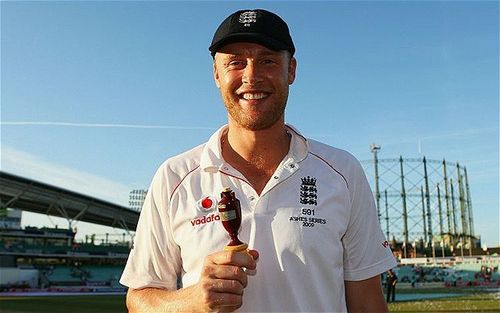
#NoMatterWhat - Andrew Flintoff: The player who changed how English Cricket was perceived

It was seven years before 2005 that Andrew Flintoff made his Test debut. The year is mentioned here specifically, in the beginning because that year divided his career, and the English cricket at large, into two different eras.
Like it was before 1947 and after in India, before July 4 and after in America, English cricket post the Ashes of 2005, were looked at through different glasses- Flintoff’s glasses.
A 6’4” bully came into the side in 1998 and didn’t impress anyone immediately. He was fat, he was erratic, and just didn’t fit in the self-imposed imperialism that the English have. He was already a hero for Lancashire, and a fortnight before his Test debut against South Africa, he hit a 24-ball 61 to help them beat Surrey in a match captained by Wasim Akram.
Akram had then remarked, that had Flintoff been born in Pakistan, he would be playing Test cricket already. So, the fat guy who weighed between 13-17 stones bowled for the first time in Nottingham against the Proteas and claimed Jacques Kallis’ wicket in the first innings.
The lad could bat a bit and bowl a bit, but bits and pieces didn’t do it in the country. The abrasiveness that came with him didn’t help either. On his 42 not out against Zimbabwe in a low scoring thriller, the man of the match Flintoff wasn’t all that (gentle) manly when he openly rebuked, ‘Not bad for a fat lad.’
But, there aren’t only old-school boys in this world. There aren’t only the ones who respect, bow down, say thank you, apologize, and maintain tradition. That such guys succeed is beyond doubt, but they are not the only ones.
There are rebels, spoilt-brats, and ones with swagger, who with all their loathsome manners possess magic to change lives. Traditions and cultures are man-made, and being an exception to something that’s not divine, isn’t a sin.
Flintoff was an exception, which was proved when England toured India for three Tests in 2001. After being comprehensively beaten in Mohali, and drawing at Ahmedabad, where Flintoff failed miserably with the bat, but impressed with the ball, Bangalore came calling, and Flintoff claimed the wicket of VVS Laxman. He claimed three more wickets in that game, but couldn’t win England the series.
But he did win them the game, when they returned to one of their colonies post-Christmas next year, as he ran through the Wankhede turf with his shirt off.
Sourav Ganguly’s deeds at the Lord’s are more famous now, so are the heroics of Yuvraj and Kaif, but it was this brat that gave cricket one of its folklores.
His career had been more fun and less serious till then, to say the least, and the bravery that had been etched with his name hadn’t begun yet. At the turn of the century, run-rates were increasing, and teams were hungry for all-rounders, and hence, Flintoff remained.
Fun, however, came at a price. His mind and body weren’t in sync and the body decided to overpower the mind, when he suffered the hernia that made him miss the Champions Trophy and the Ashes that followed.
Maybe he learnt a lesson there, as it was in 2003, that the world saw, what is now known as his build-up for greatness two years later. He smashed 142 against South Africa in a losing cause, but came back with a 95 at the Oval to help England level the series.
He claimed a five-for against the West Indies in Barbados in 2004, the first of only three in his career, and scored a century which was overpowered by Brian Lara’s 400. He was slowly rising above the image of a flamboyant brute with a monster’s approach towards the game.
He claimed 11 wickets at an average of 29 in the 3-0 win, and this was only the lull before the storm. In six years so far, Flintoff had come of age. Like a bamboo tree, his growth underneath was complete. All he needed now, was the freedom and the courage to erupt.
The Ashes of 2005, seemed like another Australian riot of the English when Glenn McGrath blew them away at Lord’s. Of all the great victories that England had achieved, the ones against Australia were greater, and of all defeats that they had succumbed to, the ones against Australia were graveyards.
The ghosts from those graveyards had risen, as they had been kept thirsty for 18 years now. It was in 1987 that England had last kissed the urn, and Steve Harmison made sure that their nemesis knew how thirsty his side was when he cut open the Australian captain with a slithering bouncer in the first test.
England went down in that game, but rose in a manner thereafter, that they haven’t given away the urn at home for a decade now.

At Edgbaston, England were hungry wolves. Trescothik and Strauss negated Brett Lee, Jason Gillespie and Michael Kasprowicz in a manner as if to tell them that all they were doing so far was hanging around the injured McGrath, and reaping off his exploits.
A fearless Kevin Pietersen, who had smashed McGrath for a straight six in the first test in a manner best described by Harmison - “I saw no fear in his eyes.”- kept going on, when Flintoff came in and in the span of 62 balls, made Ricky Ponting know that there was more to come than just the blood on the pitch.
He made 68 with five sixes, and Shane Warne, despite his four wickets, looked helpless.
England made 407, and bowled Australia out 308, helped by Flintoff’s 3-for, thereby leading them by 99 runs.
The Aussies were taken aback, but were never known as the ones who gave up. Lee and Warne made sure that the reputation wasn’t dented when they reduced England to 75/6.
It was this innings that marked the end of an era and the beginning of a new one. Freddie walked out, with his back to the walls, knowing that a defeat here would be impossible to comeback from, and decided to change things.
Men are born every day, and they die every day, but the ones who bring a change to this world are immortal.
Flintoff changed things with Geraint Jones, Ashley Glies, Harmison, and Simon Jones. He made 73 off 86, an ordinary stat, but only those who witnessed him ripping the souls off the brimming Aussies hoisting Lee and Warne over the stands would know what he did.
From 75/6, England went to 182 all-out, setting Australia a target of 282 to win. He went back to the pavilion, shred his gloves and pads off, walked out immediately, and bowled Justin Langer to open the gates that haven’t closed since.
Langer’s was his third wicket in four balls, as he had cleaned up the tail in the last innings. He got him on the second ball of the 13th over, that brought in the captain who could never win an Ashes series on English soil.
The third ball, Flintoff to Ponting, the ball pitched on good length and jagged back in sharply and hit Ponting on the pads. England appealed but Billy Bowden shook his head as the ball was too high.
Fourth ball, again the same length, Ponting edged it to gully on a bounce. Fifth ball, a fraction fuller, hit him again on the pads, as a huge appeal by England was negated again.
The final ball, was a no-ball, as Ponting left the delivery. While people might argue that it was luck, that it was a no-ball that changed the course of history, and that it wasn’t in England’s hands, but, call it whatever you want to, it was the ball of the Ashes - the no-ball.
So, the sixth ball was pitched on off, the fullest of all them, and as Ponting dragged his bat out to half-defend, half-prod, the ball moved away. With it, moved away the fortunes, the smiles, and most importantly, the urn. Ponting was caught behind by Jones off Flintoff.
He came back to remove Gillespie with a toe-crusher, and Jones snapped Kasprowicz in the catch that mattered the most for him, to draw the curtains on a heart-wrenching performance by Lee and Warne, this time, with the bat.
The bully was a hero, fat was the new fit, and after 1981, England had got a Botham. 2005 was Freddie’s Ashes, and he cemented that with a 102 in the 4th Test.
England after that believed that they could win, that the then World Champions weren’t unassailable, that every wolf can be made a sheep, if only one has the guts to fight, and Flintoff, was the one who made them believe so.
He would haunt the Aussies again the next time they came to the UK, in 2009, the first of what has been four Ashes exchanges on the British soil, despite being humbled in 2006-07, both as a player and as a captain.
Freddie reached his peak in 2005, and didn’t play that way ever after. Maybe it was because a threshold had to be set for England. They needed to be reminded time and again of what they did a decade back, and who made them do it.
Maybe it was his injuries, or maybe just fate, but the era that heralded after the graves were watered for the first time in 18 years, with beer flourishing from The Urn, hasn’t ended.